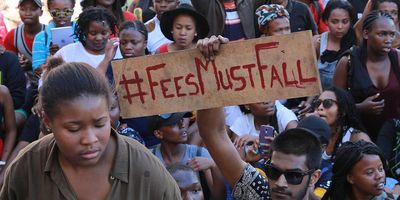South Africa's Powerful Fees Must Fall Movement Resurges
The Fees Must Fall movement resurges as students carry out a nationwide shutdown and continue to call on the government for free, quality and decolonised education for all.
South Africa's powerful Fees Must Fall movement is back in the headlines. While it never quite left but rather continued to do the necessary work without large-scale protests, students have returned to the streets from today as part of a nationwide shutdown. Students from universities all over the country are protesting the financial exclusion of especially Black learners, demanding free education for all as well as protesting the police brutality they have experienced during peaceful demonstrations which initially began last week Tuesday at the University of the Witwatersrand (Wits University).
READ: Fees Must Fall Reloaded: What Does It All Mean?
Students from across the country have come together once again to protest against the financial exclusion of Black students at universities in South Africa and renew their call for free, quality, decolonised education. Their protests also come after the government's main subsidy body, NSFAS (National Student Financial Aid Scheme) announced that it had no funds to provide first-time university students this year. NSFAS received close to 800 000 funding applications for this year alone.
Last week, Wits students led by the SRC (student representative council), protested against the financial exclusion of students who were not in possession of the registration fees required to begin a new academic year at the university. Amid those protests throughout the week, 35-year-old bystander, Mthokozisi Ntumba, was shot dead by police in Braamfontein, Johannesburg, as they reportedly attempted to disperse students with rubber bullets. Four officers have recently been arrested by the Independent Police Investigative Directorate (IPID) in connection with Ntumba's death.
While Police Minister, Bheki Cele, has since conceded that there was no logic behind the killing of Ntumba, South Africans (those protesting and those in support of the protests) are naturally wary of the possibility of yet another life lost at the hands of the police.
- Police Kill One in Ongoing South African Student Protests - OkayAfrica ›
- Fees Must Fall Activist Nompendulo Mkhatshwa is Set to Have a ... ›
- From #FeesMustFall to #BlueforSudan: OkayAfrica's Guide to a ... ›
- Fees Must Fall Reloaded: What Does It All Mean? - OkayAfrica ›
- #FeesMustFall: Where Do We Go From Here? - OkayAfrica ›
- #FeesMustFall: The Threat of the Penis and the Gun in South ... ›
